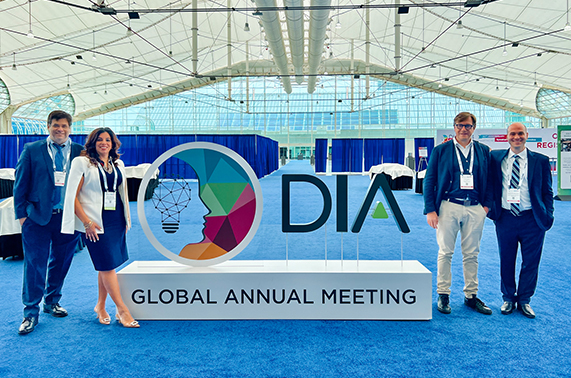InSilicoTrials recently participated in the DIA 2024 Global Annual Meeting, (16-20 June, San Diego), sharing valuable insights on the use of in silico trials, digital twins, and AI-powered predictive intelligence in drug development and patient care. This event provided a platform for discussing the transformative potential of these technologies and their applications in clinical trials.
Innovation Theater Presentation Highlights
During our Innovation Theater presentation titled “Are Human Patients Needed for Clinical Trials, Tomorrow?“, we brought together experts from various fields to discuss the advancements in in silico methods. The panel included Jonathan Helfgott, PhD (Senior Lecturer, Johns Hopkins University and Former FDA), Adam Kaplin, MD, PhD (Chief Scientific and Clinical Innovation Officer, Miralogx) and our CEO Luca Emili. Moderated by MaryAnne Rizk, PhD (CEO Rizk Management Advisor, Former Oracle, Medidata, IQVIA), the session focused on how digital simulations can enhance drug development processes and improve patient safety.
Key Points Discussed:
- Definition and Scope: In silico trials involve the use of computer simulations in the design, development, and regulatory evaluation of new drugs, devices, or interventions. These simulations provide a virtual representation of patient scenarios, allowing for extensive testing without the need for physical trials.
- Regulatory Acceptance: The panel discussed the growing acceptance of in silico methods by regulatory bodies like the FDA. This includes recent FDA Modernization Acts that promote the use of computer models as alternatives to animal testing, highlighting a shift towards more ethical and efficient testing methods.
- Efficiency and Accuracy: In silico trials offer significant reductions in time and costs associated with drug development. By identifying and discarding non-viable drug candidates early in the process, companies can save substantial amounts in synthesis costs. Additionally, these methods provide precise and accurate data on drug interactions and mechanisms of action.
Real-World Applications and Case Studies
The use of in silico models spans across various industries, including pharmaceuticals, cosmetics, and consumer electronics. For instance, pharmaceutical companies use these models for drug discovery and personalized medicine, while cosmetic companies leverage them to predict product safety and efficacy. These applications underscore the versatility and effectiveness of in silico methods.
Specific Benefits Highlighted:
- Cost and Time Savings: Achieving up to a 90% efficiency in specific R&D activities, in silico trials significantly cut down on development time and costs.
- Comprehensive Data Generation: These methods generate extensive datasets on drug interactions, disease progression, and patient profiles, enhancing the decision-making process.
- Risk Mitigation: Early identification of potential safety and efficacy issues helps reduce the risk of late-stage failures, ensuring better patient outcomes.
Engaging with InSilicoTrials
During the event, attendees were invited to visit Booth #1006 to connect with the InSilicoTrials team and also get autographed copies of “Towards Good Simulation Practice“. Co-edited by our CEO Luca Emili, with contributions from 138 global experts, including 13 FDA Modeling & Simulation Working Group members, this is an open access book published by Springer Nature providing essential guidelines for implementing in silico trials effectively.
InSilicoTrials’ participation at DIA 2024 highlighted the potential of in silico trials to revolutionize clinical trials and drug development. By leveraging digital twins and AI, we are contributing to a paradigm shift and paving the way for more efficient, accurate, and cost-effective methods in the healthcare industry.
